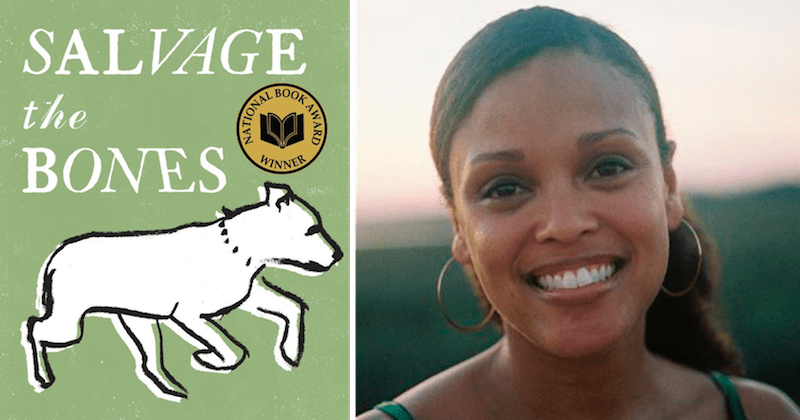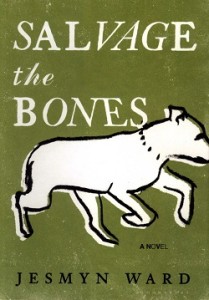

And I get up because it is the only thing I can do.
*
“Salvage the Bones, the 2011 National Book Award winner for fiction, is a taut, wily novel, smartly plotted and voluptuously written. It feels fresh and urgent, but it’s an ancient, archetypal tale. Think of Noah or Gilgamesh or any soggy group of humans and dogs huddled together, waiting out an apocalyptic act of God or weather. It’s an old story—of family honor, revenge, disaster—and it’s a good one. As Arnold Schoenberg said, ‘There is still much good music that can be written in C major.’ And Jesmyn Ward makes beautiful music, plays deftly with her reader’s expectations: where we expect violence, she gives us sweetness. When we brace for beauty, she gives us blood.
Best of all, she gives us a singular heroine who breaks the mold of the typical teenage female protagonist. Esch isn’t plucky or tomboyish. She’s squat, sulky and sexual. But she is beloved—her brothers Randall, Skeetah and Junior are fine and strong; they brawl and sacrifice and steal for her and each other. And Esch is in bloom. Her love for Manny and her love for literature have animated the world; everything is suddenly swollen and significant. ‘He makes my heart beat like that, I want to say, and point at the squirrel dying in red spurts.’ The headiness of the language is the book’s major strength and flaw. Ward can get carried away. She never uses one metaphor when she can use three, and too many sentences grow waterlogged and buckle.
…

“As a through-line, Ward weaves in the classics. Esch’s love of the Greek myths has inoculated her not from horror but from surprise. When Manny spurns her, she is ready: ‘In every one of the Greeks’ mythology tales, there is this: a man chasing a woman, or a woman chasing a man. There is never a meeting in the middle. There is only a body in a ditch, and one person walking toward or away from it.’ She already knows that nature is protean and mischievous, that the gods tumble to earth to chase mortal women, girls can turn into trees, a hurricane can laugh, and the creek will rise out of its bed and wend its way into her house ‘to eat and play.’
For all its fantastical underpinnings, Salvage the Bones is never wrong when it comes to suffering. Sorrow and pain aren’t presented as especially ennobling. They exist to be endured—until the next Katrina arrives to ‘cut us to the bone.’ And like every good myth, at its heart, the book is salvific; it wants to teach you how to wait out the storm and swim to safety.”
–Parul Sehgal, The New York Times Book Review, December 30, 2011
Check out more of the original reviews for Salvage the Bones here

